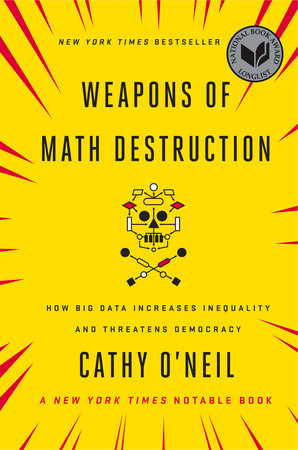If you enjoyed Freakonomics, I think you’ll really enjoy Weapons of Math Destruction by Cathy O’Neil. This book is crucial as we become an increasingly data-driven, automated world.

While it’s very exciting that we have machine learning and big data, O’Neil highlights how important it is to realize that the algorithms that we allow to run our lives in an attempt to avoid human biases are, in fact, developed by biased humans. Or they run in a biased context. And it’s important to think about this, especially in the wake of things like social media algorithms that keep us in echo chambers of people repeating shared opinions back at us and with more and more tasks becoming automated to the point where we don’t know why things happen anymore – we can only point to the computers and say “the algorithm did it”. Although the book came out before the 2016 US presidential election, she touches on the danger of our News Feeds and the fake news that can circulate in these echo chambers, which has become a huge topic of late. She also touches on how Weapons of Math Destruction were involved with the 2008 housing crisis, which was why she left the hedge fund she previously worked at.
O’Neil is not afraid to name names, either. She calls out specific companies that enable and encourage data-based biases, like police predictive software and teacher evaluations. This book really opens your eyes to the kinds of injustices that we are no longer able to say is the fault of people and, instead, just shrug and say, “Well, the numbers don’t lie.”
And it’s true, numbers don’t lie. But the thing with the Weapons of Math Destruction, which are carried out at a huge scale, is they often don’t receive feedback as to whether or not they’re working. Unlike sports statistics, which O’Neil thinks is an ideal use of data because they are constantly calibrated based on whether or not the predictions were correct, these WMDs plow forward with no regard to whether or not the predictions are correct. This is all the more dangerous if they are written with biases in them or designed as self-fulfilling prophecies.
This was one of my favorite reads this year because I am fascinated but apprehensive about the role that big data is taking in our world. While I was busy worrying about what companies can do with my data (still a valid concern!), it’s so important to understand the the lack of transparency with how some of these big data predictions and decisions are made have very serious consequences.
I highly highly recommend you pick up this book and learn about how companies are using data to perpetuate biases and to learn ways that we can start critically thinking of solutions to avoid just that.
Disclosure: I received a copy of this book from Blogging for Books in exchange for my honest review.
